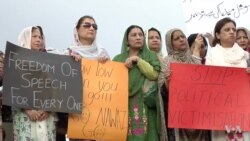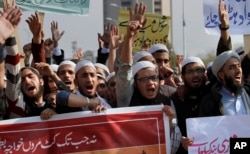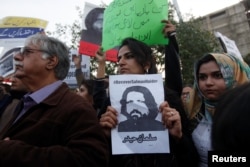Taha Siddiqui was relaxing in his living room with his son after work when he received a telephone call. On the other end of the line was a man claiming to be with the counterterrorism department of Pakistan's Federal Investigation Agency. The man, who Siddiqui said identified himself as Nadeem Bodla, a deputy director of the counterterrorism wing in the FIA, told Siddiqui to "drop everything" and immediately report to his office.
"It wasn't a courteous call," Siddiqui recalled. "It was actually a call where he was talking from a point of authority. The tone was intimidating."
As a freelance journalist working with several international outlets, Siddiqui had been covering military affairs.
His work had drawn attention in the past. Journalists who did not know him would sometimes call and urge him to rethink what he was filing, telling him authorities thought he was overstepping a boundary.
This was the first time, though, that a government entity had officially approached him. The move concerned Siddiqui, who feared an arrest over "illegal charges" or the seizure of his equipment that could compromise his work and sources.
Others questioned, too
Others, namely political activists and opposition figures, had been called in for questioning based solely on their social media activity.
One of them, Salar Sultanzai, tweeted from his handle @MeFixer that the FIA had told him to submit his cellphone and laptop for inspection.
Siddiqui decided to file a petition of harassment in the Islamabad High Court.
Interior Minister Ali Khan, in a news conference this week, maintained that the steps taken by the FIA were legal. The constitution, Khan said, barred anyone from demeaning the country's armed forces, its judiciary or its national religion, Islam.
"I assure you no one is putting any restrictions on social media," Khan said, "but a free-for-all social media is also unacceptable for a democracy."
He also said that only 27 social media identities and eight individuals had been identified for questioning and that no one had been arrested or harassed.
Party activists feel targeted
Opposition leader Imran Khan, whose PTI party held protests across the country this week, disagreed. He said the government was using excuses to crack down against activists from his party. Others from the party concurred.
"This is all political," said Faisal Javed Khan of PTI. "It's political victimization. They're picking our guys because they have been highlighting [Prime Minister] Nawaz Sharif's corruption."
Another PTI activist, Shahzad Waseem, said the crackdown went against the norms of freedom of expression. "Unfortunately, the government in Pakistan is trying to curb the voice of civil society of Pakistan," he added.
The current crackdown has revived memories of the disappearances this year of at least five bloggers. Many in the country blamed the intelligence agency ISI for picking them up for having criticized the military in their social media posts.
A countrywide uproar led to their return, but they were afraid to speak up about what happened. Most of them and their families reportedly left the country soon afterward. At least one of them told the BBC he had been tortured for pleasure by a government institution linked to the military.
Rules for social media use
On Wednesday, Interior Minister Khan directed the relevant government departments to formulate a framework "which ensures that social media is used as a medium to facilitate positive, constructive and healthy interactions … and not as a tool to propagate false information, pass defamatory comments, ridicule or humiliate sacred personalities, national institutions or jeopardizing social, religious and cultural values of any community."
He has also requested that the national assembly speaker reach out to all political parties over this issue.
Meanwhile, Siddiqui is waiting for his hearing next week to find out why he was approached over his journalistic work.

















